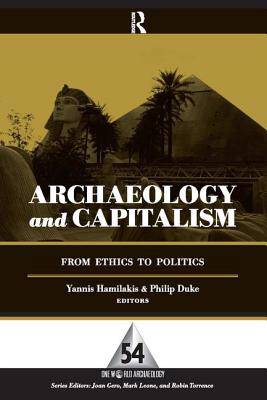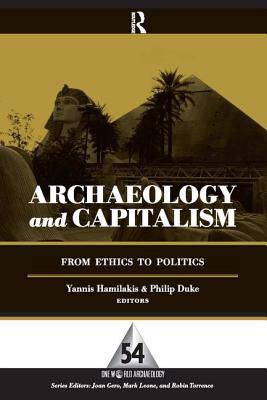
- Afhalen na 1 uur in een winkel met voorraad
- Gratis thuislevering in België vanaf € 30
- Ruim aanbod met 7 miljoen producten
- Afhalen na 1 uur in een winkel met voorraad
- Gratis thuislevering in België vanaf € 30
- Ruim aanbod met 7 miljoen producten
Zoeken
Archaeology and Capitalism
From Ethics to Politics
€ 54,45
+ 108 punten
Omschrijving
The editors and contributors to this volume focus on the inherent political nature of archaeology and its impact on the practice of the discipline. Pointing to the discipline's history of advancing imperialist, colonialist, and racist objectives, they insist that archaeology must rethink its muted professional stance and become more overtly active agents of change. The discipline is not about an abstract "archaeological record" but about living individuals and communities, whose lives and heritage suffer from the abuse of power relationships with states and their agents. Only by recognizing this power disparity, and adopting a political ethic for the discipline, can archaeology justify its activities. Chapters range from a critique of traditional ethical codes, to examinations of the capitalist motivations and structures within the discipline, to calls for an engaged, emancipatory archaeology that improves the lives of the people with whom archaeologists work. A direct challenge to the discipline, this volume will provoke discussion, disagreement, and inspiration for many in the field.
Specificaties
Betrokkenen
- Uitgeverij:
Inhoud
- Aantal bladzijden:
- 298
- Taal:
- Engels
- Reeks:
- Reeksnummer:
- nr. 54
Eigenschappen
- Productcode (EAN):
- 9781598742718
- Verschijningsdatum:
- 1/03/2009
- Uitvoering:
- Paperback
- Formaat:
- Trade paperback (VS)
- Afmetingen:
- 150 mm x 226 mm
- Gewicht:
- 476 g

Alleen bij Standaard Boekhandel
+ 108 punten op je klantenkaart van Standaard Boekhandel
Beoordelingen
We publiceren alleen reviews die voldoen aan de voorwaarden voor reviews. Bekijk onze voorwaarden voor reviews.










